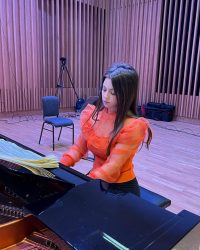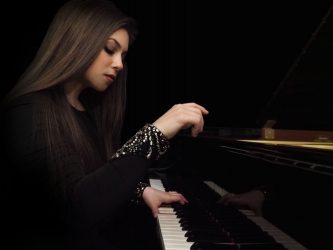 United Kingdom Bartók, Mozart, Rossini: Lara Melda (piano), Northern Chamber Orchestra / Nicholas Ward (leader/director). Livestream from the Carole Nash Hall, Manchester, 28.2.2021. (CC)
United Kingdom Bartók, Mozart, Rossini: Lara Melda (piano), Northern Chamber Orchestra / Nicholas Ward (leader/director). Livestream from the Carole Nash Hall, Manchester, 28.2.2021. (CC)

Rossini – String Sonata No.3 in C (c.1804)
Bartók – Romanian Folk Dances (1915, orch. 1917)
Mozart – Piano Concerto No.27 in B flat, K 595 (1791)
This concert under ‘normal’ conditions would have taken place in Macclesfield: instead it was performed in the smaller venue, the Carole Nash Hall, in nearby Manchester’s The Stoller Hall.
The Rossini was played in memory of the previous chairman of the Northern Chamber Orchestra, Malcolm Allcard, who along with his wife Alison enjoyed the Rossini String Sonatas (written by the composer at the ripe old age of twelve). Grace is the keyword of the performance here, plus some real discipline from the Northern Chamber Orchestra, perhaps especially the violins. The slow movement feels like much later Rossini and is certainly of operatic bent. The bold octave statements carried gravitas, the single-line then multistrand rejoinders gestures of great beauty as well as drama; lovely to hear the single double-bass pulsating like a heartbeat underneath. The carefree, Rossini-in-post-Mozart guise finale, features a (pardon the pun) string of solos initiated by leader/director Nicholas Ward. Throughout, the double-bass solos of James Manson gave particular joy.
It is quite a way to the thumping first dance of Bartók’s Romanian Folk Dances (a ‘Stick Dance’). But these dances also contain much delicacy; the way the NCO could create a gossamer-thin bed of sound for Nicholas Ward’s violin in the third. ‘In One Spot’ was most appealing as was the gentle ebb and flow while the sheer vim and vigour of the final, perfectly (and practically) titled ‘Fast Dance,’ a whirlwind performance.
All of which was prefatory to Mozart’s Piano Concerto No.27 with Lara Melda. Although conductorless, the orchestra was directed by Ward; Melda’s piano bisected the orchestra centrally. A nice sedate pace of the orchestral exposition allowed the music space to speak. Playing on a Bösendorfer with the lid removed, it was Melda who lit the performance from within. If Rossini in his piece created an operatic scena without voices and Mozart Piano Concerto slow movements are traditionally seen as arias senza voce, it was Melda who managed to find moments in the first movement that were of positively vocal bent. While her playing technique is textbook perfect, from sitting position to hand position, what comes forth speaks purely from the heart. The cadenza (Mozart’s own) offered Melda space to shine; and shine she did with playing of huge character.
The Larghetto was beautifully expressive, the long lines allowed full licence to breathe and with a real sense of dialogue between piano and orchestra. The sparkling passagework of the finale worked beautifully on the Bösendorfer, its slightly darker sound (compared to a Steinway or, certainly, to a Yamaha) allowing for just the right amount of glint. Another terrific cadenza in the finale attended to Melda’s affinity to this music.

I thoroughly enjoyed Lara Melda’s Chopin disc on Champs Hill (not yet reviewed on MusicWeb International so here is my own article on it); one hopes for a Mozart follow-up on the strength of this K 595.
Colin Clarke
For more about the Northern Chamber Orchestra click here.
